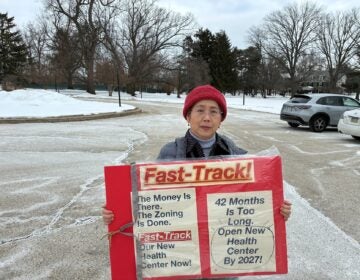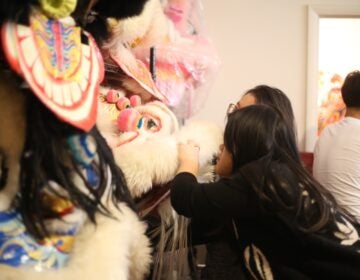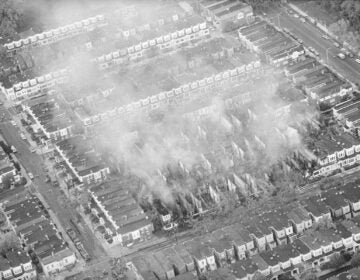Landlords urged to test paint as part of Philly effort to keep kids safe from lead poisoning

Philadelphia Health Commissioner Thomas Farley outlines the city's plan to prevent lead poisoning. (Emma Lee/WHYY)
For years, Philadelphia has struggled to protect kids from exposure to lead. In December, a special advisory group began to address the problem.
The group released its final report and recommendations Tuesday.
Last year, 341 children in Philadelphia tested for lead levels above 10 micrograms per deciliter of lead in blood. No amount of lead in the blood is considered safe, but doctors become concerned when levels rise above 10.
The good news is 2016’s numbers are far lower than they were 10 years ago, but it’s still too many kids, said Mayor Jim Kenney.
“While lead poisoning has dramatically declined in recent years, we are committed to reducing its presence even further here in Philadelphia,” he said Wednesday.
Dr. Tom Farley, city health commissioner, expounded on that point.
“We all know that exposure to lead can impair a child’s development. Now the levels of lead that we’re seeing in kids today — unlike those that we saw 50 years ago — don’t cause obvious brain damage, but they do cause subtle effects on behavior and attention span and intelligence that none of us want,” he said.
Unlike Flint, Michigan, and other cities, most lead exposure in Philadelphia comes from old lead paint in houses.
In its “Lead-Free Kids” plan, issued in December, the city focused on educating tenants about possible lead paint through public education campaigns and door-to-door outreach in Strawberry Mansion and other neighborhoods where levels are especially high.
The current recommendations focus on ensuring landlords provide a safe unit for tenants.
“The key recommendation here would be to require every landlord of a property built before1978 test and certify those properties as being lead safe or lead free,” said Farley.
Currently, landlords must supply proof of a lead-safe home if the property was built before 1978 and if a child 6 or younger is living there.
But the group said enforcing that law is difficult because there’s no database of where all young children live in the city. So, the group advised, the criterion around young children should be removed.
Remediating a property to make it lead safe for a period of time can cost between $1,000 and $10,000, said Farley, recognizing that some landlords won’t be able to afford that.
Since Medicaid reimburses pediatricians who do testing for lead levels, perhaps it can help out here as well, he suggested.
“The recommendation is to see whether we can get the state to request of the federal government a waiver so Medicaid funds could be used for remediation,” said Farley.
The recommendations also propose urging a statewide tax on paint to help pay for lead remediation.
WHYY is your source for fact-based, in-depth journalism and information. As a nonprofit organization, we rely on financial support from readers like you. Please give today.




